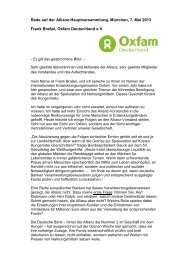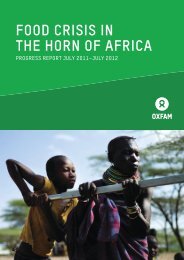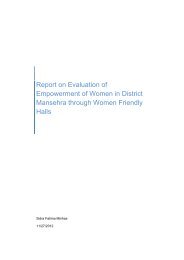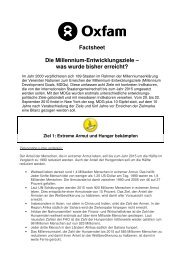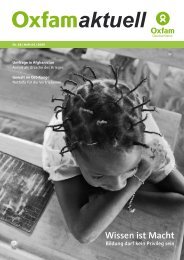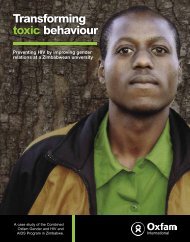No Time to Lose - Oxfam
No Time to Lose - Oxfam
No Time to Lose - Oxfam
You also want an ePaper? Increase the reach of your titles
YUMPU automatically turns print PDFs into web optimized ePapers that Google loves.
that the ANSF are in many cases no more respectful than international<br />
forces, and that abuses occur both with and without their<br />
presence. 50<br />
The recruitment and abuse of children<br />
A further concern across all components of the ANSF is the recruitment<br />
and abuse of children. While the GIRoA does as a matter of<br />
policy prohibit the recruitment of children in<strong>to</strong> the armed forces, the<br />
Afghan Independent Human Rights Commission (AIHRC) reports<br />
that in many cases the families of young boys, desperate for an<br />
ANSF salary, bribe Ministry of Interior (MoI) verification officers <strong>to</strong><br />
issue false identification documents. These are rarely questioned by<br />
officials when young boys sign up <strong>to</strong> the ANSF. 51 The Secretary<br />
General’s recent report on Children and Armed Conflict noted that<br />
ANP recruitment campaigns had in some cases been carried out in<br />
school compounds, and that girls and boys over the age of 16 were<br />
being accepted in<strong>to</strong> police training. 52 Incidents of sexual abuse and<br />
exploitation of boys (including the practice referred <strong>to</strong> as bacha bazzi<br />
or ‘dancing boys’) by the ANSF have also been reported, although<br />
the subject is so taboo that understanding the extent of the problem<br />
is difficult. 53<br />
Mistreatment during detention<br />
Among the most serious allegations directed at the ANSF are allegations<br />
of <strong>to</strong>rture and other cruel, inhuman or degrading treatment or<br />
punishment during detention. In a survey carried out by the AIHRC<br />
between 2006 and 2008, covering 398 detainees being held by all<br />
components of the security forces, 98.5 per cent said that they had<br />
been abused. Allegations included ‘punching, kicking, slapping and<br />
humiliation’, the deprivation of sleep, food or water, beating with a<br />
scorching bar, iron bar or police ba<strong>to</strong>n, and ‘flogging by cable and<br />
electric shock.’ 54 AIHRC also interviewed 98 law enforcement officers,<br />
less than a quarter of whom said that they used ‘the collection<br />
of evidence and documents’ <strong>to</strong> investigate crime. 30 per cent said<br />
that they used ‘methods based on law and logic’ or ‘technical methods’;<br />
the remaining 40 per cent either declined <strong>to</strong> answer the question<br />
or said that they used ‘other methods’. 55<br />
Other violations of human rights and humanitarian law<br />
Information regarding abusive conduct on the part of the ANSF is<br />
difficult <strong>to</strong> obtain, due in part <strong>to</strong> the absence of reporting mechanisms,<br />
and in part <strong>to</strong> reluctance on the part of community members<br />
<strong>to</strong> overtly criticise the security forces – particularly the police. 56<br />
Other alleged violations of human rights and international humani-<br />
13




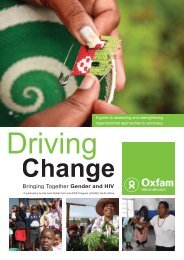

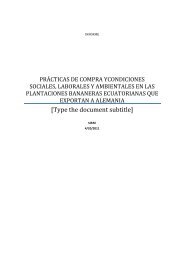
![Download: Faltposter EU-Handelspolitik [PDF 2,17MB] - Germanwatch](https://img.yumpu.com/25095854/1/190x161/download-faltposter-eu-handelspolitik-pdf-217mb-germanwatch.jpg?quality=85)
